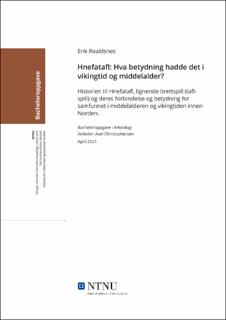| dc.contributor.advisor | Christophersen, Axel | |
| dc.contributor.author | Roaldsnes, Erik | |
| dc.date.accessioned | 2021-09-13T16:06:26Z | |
| dc.date.available | 2021-09-13T16:06:26Z | |
| dc.date.issued | 2021 | |
| dc.identifier | no.ntnu:inspera:79993908:36618450 | |
| dc.identifier.uri | https://hdl.handle.net/11250/2775670 | |
| dc.description.abstract | Tafl-spill har en lang historie innen Norden, og er ofte sett på som tidsfordriv av både arkeologer og historikere. Denne avhandlingen har som mål å skape innsikt inn i hvordan det Nordiske tafl ble spilt, hvem det var som spilte det, og gjøre en vurdering om den sosiale og kulturelle betydningen tafl hadde for vikingtiden og middelalderens samfunnsliv.
Voluspå er en sentral kilde for innsyn for informasjon, og viser til at brettspill kan ha hatt symbolisme om fruktbarhet, det gode liv og en metafor for tidenes morgen. Drikkehorn og avbildninger på blant annet Gallehushornet, styrker dette teorien. Lovverk er en av de andre kildene som viser til at brettspill var utbredt i både middelalder og vikingtid, og at det ofte skapte problemer. I flere Islandske kilder så er det vist til at den Norske kongen påsatte selv det islandske folket forbud og lover mot brettspill på 1200-tallet. Senere, så ble disse forbudene oppløst, på grunn av den katolske kirkens oppvarming til brettspill, spesielt sjakk i løpet av 1250-tallet. Hasardspill var fremdeles ikke lovlig på grunn av den katolske kirkens stilling de, så terningsvariantene av brettspill var observert, men tafl ble stødig mer populært.
Gjennom analyse av kildene, så ser man at tafl var et tidsfordriv, men hadde stor betydning innen både vikingtiden og middelalderen. Kunnskapen om å kunne spille tafl var en svært attraktiv egenskap for menn å kunne, og det var troligvis ofte en æressak for høytstående mennesker innen samfunnet. Samlet med tafl sin fruktbarhetssymbolisme, og andre sosiale aspekter, så var brettspill og tafl en viktig del av det Nordiske samfunnet gjennom disse tidene, som vist av at brettspill dukker opp flere steder innen viktige sagaer og historiske dokumenter. | |
| dc.description.abstract | Hnefatafl has a long history in the Nordic countries, and are often seen as a pastime by both archaeologists and historians. This thesis aims to create insight into how the Nordic tafl-games were played, who played it, and assess the social and cultural significance of Hnefatafl within the Viking Age and medieval society.
The Voluspå is a central source of access to information and points out that board games may have had symbolism about fertility, the good life, and a metaphor for the dawn of time. Drinking horns and their imagery, among other things, the Gallehus horn, strengthen this theory. Legislations is another type of sources that indicate that board games were widespread in both the Middle Ages and the Viking Age, and that it often caused problems. In several Icelandic sources, it is pointed out that the Norwegian king himself imposed a ban and laws against board games on the Icelandic people in the 13th century. Later, these bans were lifted, due to the Catholic Church's warming up to board games, especially chess, during the 1250s. Gambling was still not legal due to the position of the Catholic Church, so the dice variants of board games were observed, but the table became steadily more popular.
Through analysis of the sources, it is clear that tablet was a pastime, but had great significance in both the Viking Age and the Middle Ages. The knowledge of how to play tafl was a very attractive quality for men, and it was probably often a matter of honor for high-ranking people in society. Combined with tafl's fertility symbolism, and other social aspects, board games and tafl were an important part of Nordic society through these times, as is strengthened by the appearances of it in several sources within important sagas and historical documents. | |
| dc.language | nob | |
| dc.publisher | NTNU | |
| dc.title | Hnefatafl: Hva betydning hadde det i vikingtid og middelalder? | |
| dc.type | Bachelor thesis | |
